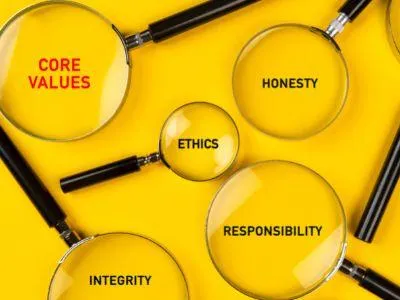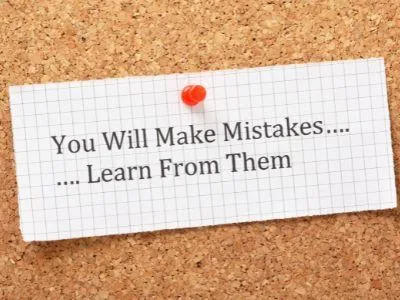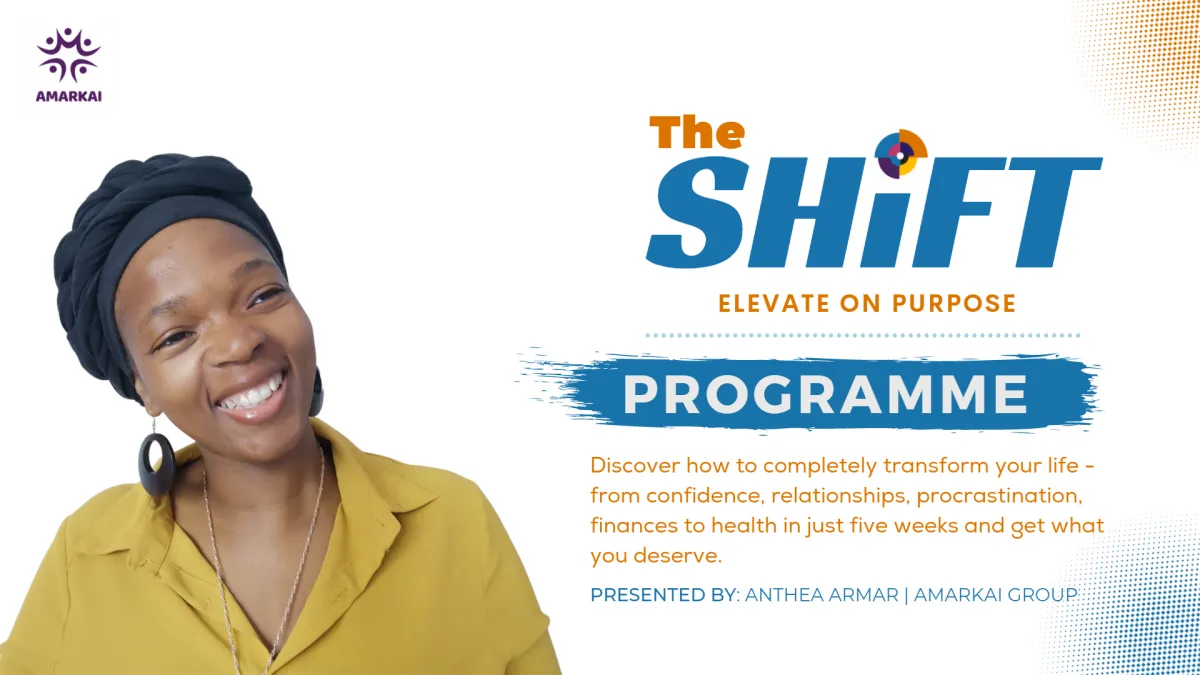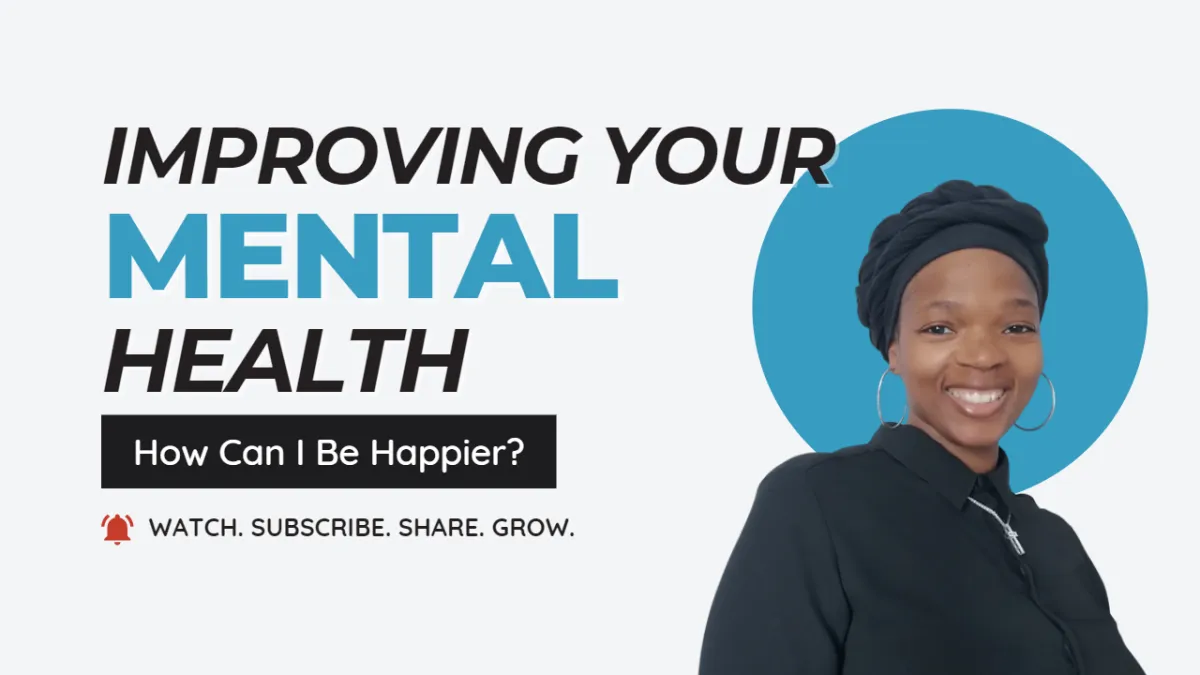SELF REFLECT YOUR WAY TO SUCCESS
Three Ways to Use Self-Awareness to Improve Your Success in Life
…so you can have more control of your life!
Author: Anthea Armar
Date Published: 7 July 2022
Topics: Self-Awareness, Wellbeing, Mental Health, Success, Relationships
Estimated Read Time: 7 minutes
World Wellbeing Week took place between 27 June and 1 July 2022 to promote “health, happiness and inspiration for all” and allow organisations to celebrate a variety of aspects relating to wellbeing, such as community relations, the environment, financial security, social resilience and physical, mental and emotional health.
According to Oxford Languages, wellbeing is “the state of being comfortable, healthy, or happy.” How often do you ask yourself whether you are any, or all, of those things?
How often are you checking in with yourself to learn more about where you are, where you want to be and what the gap looks like?
- Are you where you want to be in life?
- Are you suffering with any physical, emotional or mental issues at the moment?
- Do you feel successful?
- Do you enjoy your life?
- Do you like the relationships you have?
- Are you confident?
- Do you enjoy your work (career / business)?
- Are you happy?

Image Source: Brett Jordan (Unsplash)
Your ability to succeed in life comes down to how often you check in with yourself, and others, and use that information to make any necessary changes. Life happens and people will do things that you can’t control, but your responses to both will determine how you progress in life.
If you want to develop yourself to your fullest potential, you must master the art of self-awareness. The more you understand yourself, the more likely it is that you’ll be able to achieve your long-term goals, find happiness, and even strengthen your overall confidence and self-esteem.
Why does self-awareness matter?
Self-awareness is the art of paying attention to the way you think, behave, and feel. It means looking carefully at patterns in the way you perceive the world, yourself, and the people around you.
Self-awareness also includes understanding your moods and emotions and how they influence the things you do, including make decisions about your future.
If you go through life not challenging how you respond to the world, yourself and those around you, it can impact your confidence and keep you trapped in the assumptions that were created during your upbringing.
If you have negative default responses to things, self-awareness can help you to overcome them. For instance, those with alcohol or weight issues often benefit from becoming more self-aware. This then leads to being able to change the decisions and habits that prevent your ability to achieve your goals.
"Until you make the unconscious conscious, it will direct your life and you will call it fate." C.G. Jung
Someone who is self-aware can pay attention to their actions in any situation and determine whether they are really taking the best steps to preserve their interests, or whether they could be moving in the wrong direction.
Being able to understand situations through different perspectives provides you with options that you were previously blind to. It expands your mind and allows you to develop more of a growth mindset, which also frees you from your limiting beliefs.
It helps you to really get aligned to yourself and your core values and how they are evident in the decisions you make and therefore the experiences you have. This links to your relationships, job, business, health, finances and every other aspect of your wellbeing.
So, when you determine what wellbeing or success looks like for you, you can identify the steps needed to achieve it, based on new information and not old beliefs.
How can you become more self-aware?
How self-aware do you consider yourself to be?
- Are you aware of your strengths and weaknesses?
- Do you know what kind of things trigger your emotional and physical responses in daily life?
- Are you conscious of the opportunities and challenges that present themselves to you on a daily basis, and what your options are to overcome them?
Self-awareness is an often-underestimated skill that anyone can learn to improve with the right activities. On this path of personal exploration, you’ll discover both positive and negative things about yourself. Some of them may surprise you.
Here are a few ways you can quickly and effectively raise your self-awareness and overcome moments of confusion:
1. Observe others

Image Source: Aaron Burden (Unsplash)
This might seem counterproductive, as paying attention to others pulls the focus away from you. However, sometimes, when we’re struggling with our own self-awareness, we find it easier to project the things we don’t like in ourselves onto other people.
For instance, you might find that you absolutely hate it when others lie to you. However, if you look a little closer at your own actions, you might discover that you have a tendency to bend the truth too – even if only in certain aspects of your life.
2. Focus on your thoughts
Most of us have ingrained responses to things that we’ve developed over time. For instance, people who smoke tend to reach for a cigarette automatically whenever they feel stressed or overwhelmed. Sometimes, these processes are so automatic that we don’t even realise what’s happening until we’ve already done something.
Understanding what led you to take a specific action helps you notice your patterns. Sometimes, it won’t be a specific thought or series of thoughts that led to an action, but a simple feeling, or gut desire for something. The more you make yourself aware of those automated reactions, the more you can begin to question them when you notice them starting.
You can also be more aware of the triggers that cause those responses to happen.

3. Seek feedback

Image Source: krakenimages (Unsplash)
Asking for feedback can help you to become more aware of the things that others see in you. Sometimes, we’re so used to the image that we create of ourselves in our own mind, that we actually replace reality with our own perception. We all have blind spots that make it more difficult to solve the real problems we have in our lives.
For instance, you might think that your biggest issue is that you can’t control your emotions when something happens in your relationship. However, your girlfriend might think that the problem is that you don’t talk enough about how you feel.
Asking for insights from others in your life allows you to view your actions and feelings from a different perspective.
Just ensure that you’re comfortable with the person you ask for feedback from. If you don’t like the person very much, or you don’t trust their opinion, then this is going to skew your perception of yourself even further.
4. Control your emotions
Avoid allowing your emotions to make your decision. The more emotionally charged you are, the more difficult it is to stay focused on the challenges you are facing.
It’s important to remain calm and level-headed.
If you feel very emotional, walk away temporarily and make the decision when you can respond wisely, instead of just reacting based on how you feel at the moment.

5. Set a deadline

Image Source: krakenimages (Unsplash)
Specify when the decision needs to be made. In most cases, any decision is better than none at all.
The amount of time lost through indecision prevents you from completing other work and attending to other priorities. Making a decision will allow you to determine whether it worked out in your favour or not, rather than pondering how it will turn out.
Gather pertinent information and then make your best decision based on those facts by your deadline.
6. Consider your values
Your values and principles are important, so keep them in mind when making a decision.
Anything that can potentially conflict with your values, or the values of your business, are likely to have a detrimental effect on you and your brand, even if you increase profits.
For each option you are considering, ask yourself if it supports your values.
Will you be able to live with the consequences of choosing that option?
There is always another way, so find one that aligns so that you can have a clear conscience.

7. Take advice from others

Image Source: krakenimages (Unsplash)
Even though you may be the boss, it’s important to consider other people's viewpoints, especially if the decision will affect them.
Your colleagues, network, accountability group etc. may offer a different option or insight that you may not have thought of.
Consider others who have been in similar situations that may be able to explain their challenges, decisions and consequences, which you can learn from and apply what might work for you.
8. Relax
Decision making can be stressful and increase your anxiety.
Trying to be clearheaded when stressed may cause you to make decisions from a place of frustration.
Sometimes a short break away from everything is all you need to feel better and come at the issue with a fresh perspective.

9. Have multiple options

Image Source: krakenimages (Unsplash)
You don’t have to only have a plan A when it comes to business decisions.
It is always good to have a plan B, or even a plan C. This doesn’t indicate a lack of confidence in the decision you have made, but allows you to consider various solutions to the same problem.
If one plan doesn’t work out as well as you had hoped, having multiple plans will allow you to go right into a new one without further procrastination around decision making.
10. Learn from your mistakes
We all make mistakes. It’s just part of business. Realising that mistakes are not failure will allow you to revisit the challenge, the decision and how it was executed in order to see why it didn’t work.
It may have been the right decision, but due to unexpected circumstances outside your control, it didn’t have the impact you wanted.
It may have been the wrong decision, but it gave you insight into your decision-making process that will help you make smarter decisions moving forward.
If you are open to learning from these mistakes, you’ll be able to adapt wisely for the future.

"It’s not what you have to start doing, it’s what you have to stop believing." Anthea Armar
Your Self-Awareness For Success Checklist
Self-awareness takes courage. It requires you to challenge your current way of thinking and the beliefs you have built your entire life on. The benefit of going through this, sometimes uncomfortable, process is that it frees you to redefine the values you want to live by, not those that were ingrained into you during childhood. Put these tips into practice and you will find yourself reaching new levels of success that you had not anticipated:
- Observe others - make a list of the properties you dislike about other people and try to focus on pinpointing the moments when you show those characteristics yourself. At the same time, it may also be helpful to make a list of the things you like to see in others, so you can actively try to show more of those properties yourself.
- Focus on your thoughts - if you want to be more self-aware, take a moment to pause the next time you have an automatic response to something. Be aware of how you’ve responded in that moment and try rewinding through your thought processes. What led you from the point of feeling stressed to shouting at your colleague, for instance?
- Seek feedback - take time to speak with others about how they perceive you. This will help you become more aware of how you interact with others and how you portray yourself. Once you get the feedback, remember to take it well. Avoid looking at negative comments as a direct attack on you. Instead, see them as a chance to develop and grow.
- Control your emotions - separate your emotions from the situation you are facing. Emotions can be temporary and making a decision in the moment could cause long-term damage. Take a break and come back to it when feeling more level-headed.
- Set a deadline - avoid delaying making a decision by setting a deadline. Use that time you have to gather all pertinent information and make the best decision based on what you have available to you at the time.
- Consider your values - ensure that whatever you are considering aligns to your values and your business values. Make a list of your personal values and another list of your business values. Anything that causes conflict with your values is likely to express itself to your customers and send mixed messages about your brand.
- Take advice from others - don’t go it alone. Seek insights from others who may have other perspectives you have not yet considered. Your local business support group may also be of help in making your decision. Other members of the group may have faced the same situation before and could offer some sage advice.
- Relax - step away from any potential anxiety and overwhelm for 10-20 minutes to clear your mind and relax yourself. Coming back with fresh perspectives may help you make a decision much quicker.
- Have multiple options - consider many possibilities and then choose the best one to move forward with. Outline each decision separately, including who it impacts, the steps involved and timelines for completion and review. If, for whatever reason it doesn’t work out, you can revisit the other options, rather than starting from scratch.
- Learn from your mistakes - Look back at whatever decision you wish to analyse. What was the outcome? How would you change things if you had to make the same decision again?
Conclusion
Take time to strengthen your self-awareness by using these easy strategies. As you explore yourself, you’ll discover that you’re capable of transforming yourself and creating your own world.
You’ll be able to see yourself as you really are. You can either try to escape from this knowledge, or welcome it with open arms as an opportunity for self-development.
If you welcome it, you could change the traits you dislike and build on those traits you do like. Frequently, we have behaviours left over from childhood that served us well then, but don’t work well for us as adults.
Once you make those changes, you’ll find that, not only do you know yourself better, but your life also becomes more enjoyable. Self-awareness is what will bring you closer to success; it empowers you to get out of your own way.
Want to dive deeper?
Amarkai Group offers a variety of wellbeing workshops and organisational coaching that focus on adopting a growth mindset and challenging limiting beliefs, which are essential for removing barriers to success.

We focus on helping you to tap into your current belief system and make the necessary changes that will improve your health, finances, productivity, wellbeing and relationships with yourself and others.
Decide to become a high performing organisation. Contact us today to learn more about coaching or workshops to improve wellbeing in your organisation.
“Anthea presents a lot of sound information for creating the business you want. She emphasizes that our own transformation is what is needed to move forward and that we create what we want-master of our business and our life. We create what we choose. She also challenges participants to get into action-don't keep waiting for amazing to come to you-create it!”
Anonymous
Liked this blog? Be sure to share.
How do you practice self-awareness? Let us know in the comments.
© AmarkaiGroup.com ・All Rights Reserved・Terms & Conditions・Privacy・Cookie Policy・Site by Christa Potter














